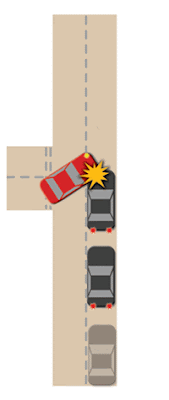ABS Questions
Should I pump the brake pedal when stopping in slippery conditions?
You absolutely should not pump the brake pedal in a car with ABS. Pumping the brakes is a technique that is sometimes used in slippery conditions to allow the wheels to unlock so that the vehicle stays somewhat straight during a stop. In a car with ABS the wheels should never lock in the first place, so pumping the brakes will just make you take longer to stop.
You absolutely should not pump the brake pedal in a car with ABS. Pumping the brakes is a technique that is sometimes used in slippery conditions to allow the wheels to unlock so that the vehicle stays somewhat straight during a stop. In a car with ABS the wheels should never lock in the first place, so pumping the brakes will just make you take longer to stop.
In an emergency stop in a car with ABS, you should apply the brake pedal firmly and hold it while the ABS does all the work. You will feel a pulsing in the pedal that may be quite violent, but this is normal so don't let off the brake.
Do anti-lock brakes really work?
Anti-lock brakes really do help you stop better. They prevent wheels from locking up and provide the shortest stopping distance on slippery surfaces.
Anti-lock brakes really do help you stop better. They prevent wheels from locking up and provide the shortest stopping distance on slippery surfaces.
Some people think that drivers of ABS-equipped cars use the ABS incorrectly, either by pumping the brakes or by releasing the brakes when they feel the system pulsing. Some people think that since ABS allows you to steer during a panic stop, more people run off the road and crash.
Some more recent information may indicate that the accident rate for ABS cars is improving, but there is still no evidence to show that ABS improves overall safety.
Anti-Lock Brake Diagram
Now let's put the parts together to see how anti-lock brakes work as a whole. This diagram provides both a closeup view and an example of where the brakes are located in your vehicle.
Anti-lock brake components
Four Main Components to an ABS System:
- Speed sensors
- Pump
- Valves
- Controller
Speed Sensors
The anti-lock braking system needs some way of knowing when a wheel is about to lock up. The speed sensors, which are located at each wheel, or in some cases in the differential, provide this information.
The anti-lock braking system needs some way of knowing when a wheel is about to lock up. The speed sensors, which are located at each wheel, or in some cases in the differential, provide this information.
Valves
There is a valve in the brake line of each brake controlled by the ABS. On some systems, the valve has three positions:
There is a valve in the brake line of each brake controlled by the ABS. On some systems, the valve has three positions:
· In position one, the valve is open; pressure from the master cylinder is passed right through to the brake.
· In position two, the valve blocks the line, isolating that brake from the master cylinder. This prevents the pressure from rising further should the driver push the brake pedal harder.
· In position three, the valve releases some of the pressure from the brake.
Pump
Since the valve is able to release pressure from the brakes, there has to be some way to put that pressure back. That is what the pump does; when a valve reduces the pressure in a line, the pump is there to get the pressure back up.
Since the valve is able to release pressure from the brakes, there has to be some way to put that pressure back. That is what the pump does; when a valve reduces the pressure in a line, the pump is there to get the pressure back up.
Controller
The controller is a computer in the car. It watches the speed sensors and controls the valves.
The controller is a computer in the car. It watches the speed sensors and controls the valves.











